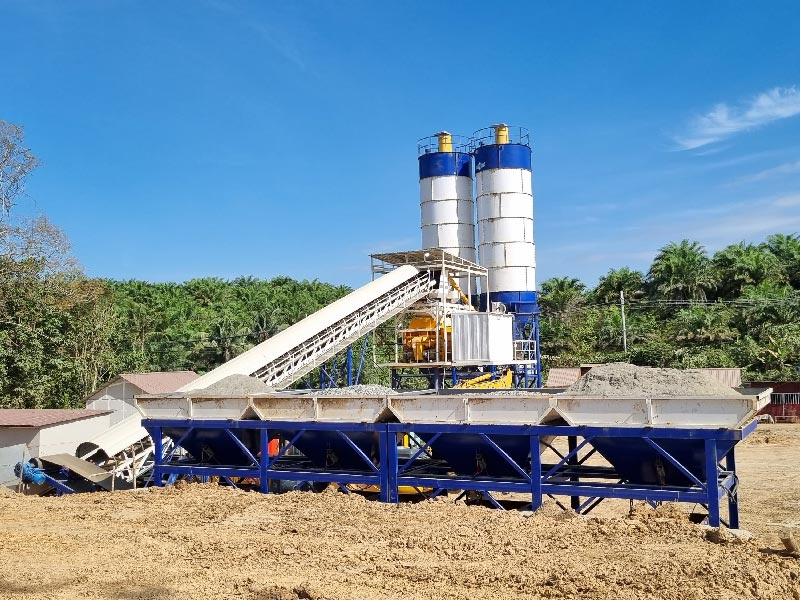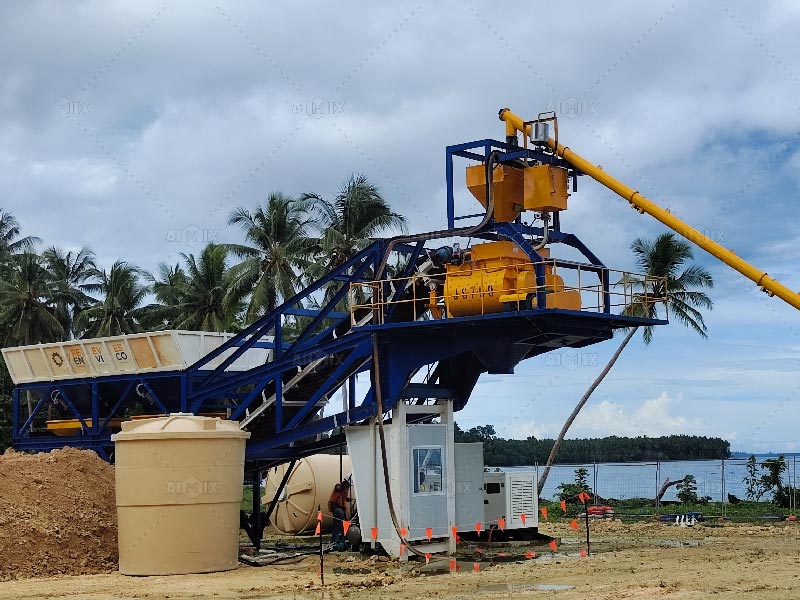The accuracy of the batching process is crucial for achieving high-quality concrete in construction projects. A concrete plant employs various techniques and technologies to ensure precise measurements, enhancing efficiency and minimizing material wastage. This article explores how concrete plants maintain batching accuracy, factors influencing it, and the role of modern advancements.
Importance of Accuracy in Concrete Batching
Accurate batching is essential for producing consistent concrete mixes. It ensures that the right proportions of cement, aggregates, water, and additives are used, directly impacting the strength, durability, and workability of the final product. Moreover, it helps optimize costs by preventing overuse or underuse of materials, which is particularly important for mini concrete plants and large-scale projects alike.
Inaccurate batching can lead to significant problems such as weaker concrete, reduced durability, and increased costs due to material wastage. Therefore, concrete plants(plantas concreteras) prioritize precision to meet the strict requirements of modern construction projects.

Key Components of a Concrete Plant That Influence Accuracy
Weighing Systems
Concrete plants are equipped with advanced weighing systems to measure materials precisely. Load cells, digital scales, and automated systems work together to ensure accurate weights for each batch, minimizing errors caused by manual handling. Regular calibration of these systems is essential to maintain their reliability over time.
Mixing Equipment
The efficiency of mixers plays a vital role in achieving uniform distribution of materials. Modern concrete plants use high-performance mixers that ensure thorough blending, reducing inconsistencies in the final product. High-quality mixers also minimize energy consumption and reduce mixing time, further improving operational efficiency.
Control Systems
Automated control systems monitor and adjust the batching process in real time. These systems use sensors and software to ensure materials are dispensed in the correct proportions, maintaining consistency across batches. Operators can program specific mix designs into the system, allowing for seamless production of various concrete grades.
Technologies Used to Enhance Batching Accuracy
Automation and Sensors
Automation is a game-changer in the concrete industry. Automated batching systems rely on sensors to measure and control the flow of materials, reducing human error and improving accuracy. This is particularly beneficial for mini concrete plants(mini planta de concreto), where space and resources are limited. Advanced automation also enables faster production cycles, meeting the demands of time-sensitive projects.
Moisture Control
Water content in aggregates can vary, affecting the water-cement ratio. Modern plants use moisture sensors to detect and adjust water levels in real time, ensuring the desired consistency of the mix. These sensors are integrated into the control system, allowing for automatic adjustments that prevent over-watering or under-watering.
Real-Time Monitoring
Advanced monitoring systems provide real-time data on the batching process. Operators can quickly identify and rectify issues, minimizing delays and ensuring each batch meets quality standards. These systems often include alerts and diagnostic tools, making it easier to address potential problems before they escalate.

Factors That Impact the Accuracy of Batching
Material Quality
Variations in material quality, such as aggregate size or moisture content, can affect batching accuracy. Regular testing and quality control measures are essential to maintain consistency. Concrete plants often establish partnerships with reliable suppliers to ensure the consistent quality of raw materials.
Calibration of Equipment
Regular calibration of weighing and dispensing equipment is critical for accuracy. Even minor deviations can lead to significant inconsistencies over time. Many plants follow a strict maintenance schedule to ensure all equipment remains in optimal working condition.
Environmental Conditions
Temperature, humidity, and other environmental factors can influence the performance of batching equipment. For example, high humidity can increase the moisture content of aggregates, requiring adjustments in the batching process. Concrete plants often implement measures such as climate-controlled storage to mitigate these effects.
Operator Training
Well-trained operators play a crucial role in maintaining batching accuracy. Even with advanced automation, human oversight is necessary to monitor the process and make critical decisions. Regular training programs help operators stay updated on the latest technologies and best practices.
How Mini Concrete Plants Ensure Accuracy
Mini concrete plants are compact and designed for smaller projects, but they still require precise batching to deliver high-quality mixes. These plants often feature portable weighing systems, advanced automation, and efficient mixers to achieve the same level of accuracy as larger plants. Additionally, their lower concrete batching plant price(planta dosificadora de concreto precio) makes them an economical choice for small-scale operations without compromising quality.
Despite their smaller size, mini concrete plants can be equipped with advanced features such as moisture sensors, automated controls, and real-time monitoring systems. These enhancements make them ideal for remote or urban construction sites where space and resources are limited.
Cost-Effective Solutions for Accurate Batching
Investing in advanced technologies and regular maintenance may seem costly, but it pays off by reducing material waste and ensuring consistent quality. Many manufacturers offer customizable options to suit different project requirements, balancing cost and performance. Understanding the concrete batching plant price and its components can help businesses make informed decisions.
For example, a mini concrete plant may have a lower initial cost but still provide high levels of accuracy due to its compact design and efficient components. Comparing the features and prices of different models can help businesses find the best solution for their needs.
Future Trends in Batching Accuracy
As technology continues to evolve, concrete plants are adopting innovations such as artificial intelligence (AI) and machine learning to enhance batching accuracy. These technologies can analyze data from previous batches to optimize future processes, reducing errors and improving efficiency. Additionally, the integration of IoT (Internet of Things) devices allows for seamless communication between different components of the plant(planta de concreto peru), further improving precision.
Sustainability is another emerging trend. Many plants are focusing on reducing waste and energy consumption, aligning with environmental regulations and industry standards. Accurate batching plays a key role in achieving these goals by minimizing overproduction and material wastage.
Conclusion
Maintaining accuracy in the batching process is essential for the success of any construction project. From advanced weighing systems to real-time monitoring and automation, concrete plants leverage a range of technologies to ensure precision. Whether you opt for a large plant or a mini concrete plant, investing in quality equipment and maintenance can significantly enhance efficiency and reduce costs. By prioritizing accuracy, concrete plants not only deliver superior mixes but also contribute to sustainable construction practices. The continuous adoption of innovative technologies ensures that the concrete industry remains at the forefront of quality and efficiency.
